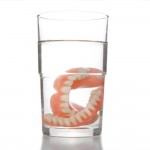
While oral health has been improving in recent decades the prevalence of edentulousness is still high in some countries and levels of edentulousness tend to increase with age. It has been estimated that as many as 46% of older adults are at risk of malnutrition and dental status is one of a range of factors that influence this. Provision of dentures has an impact on dietary patterns and some studies have demonstrated that implants supported overdentures are better than conventional dentures.
The aim of this review was to investigate whether overdenture treatment provides greater improvement in nutrient intake and markers of nutritional status than treatment with a conventional denture in edentulous patients.
Methods
Searches were conducted in the Medline, EMBASE and the Cochrane Central Register of Controlled Trials (CENTRAL) databases. Randomised control trials (RCT), cohort or case control studies which compared the treatment effect of an overdenture to conventional denture on nutrition, in which primary outcomes included changes in intake of macronutrients and/or micronutrients and/or indicators of nutritional status were considered.
Two reviewers independently selected studies and one reviewer extracted the data, which was checked by the second reviewer. Study quality was assessed independently by two reviewers using the Cochrane risk of bias tool. A fixed effects model was used to estimate the weighted mean difference (WMD) and 95% CI for change in body mass index (BMI), albumin and serum vitamin B12 between overdenture and conventional denture 6 months after treatment.
Results
- 8 studies involving 901 patients were included (6 RCTs, 2 prospective cohorts)
- 3 groups of outcome measures were considered; macro-nutrient intake, micronutrient intake and markers of nutritional status.
- 3 RCTs provided information on BMI, albumin and serum vitamin B12 required for data pooling. There was no significant difference in:-
- BMI between an overdenture and conventional denture (WMD= −0.18 kg/m2; 95% CI −0.52 to 0.16; p=0.44)
- albumin (WMD= −0.23 g/L; 95% CI −0.79 to 0.34; p=0.73) or
- vitamin B12 (WMD= −11.16 pmol/L; 95% CI −30.43 to 8.12; p=0.43).
Conclusions
The authors concluded:-
The narrative appraisal and meta-analysis demonstrated that, compared with conventional denture treatment, overdenture treatment did not have a greater effect on changes in BMI, albumin or vitamin B12 six months after treatment among the older population. Considering cost effectiveness, the utility of overdenture treatment. might be limited with regard to nutrition improvement. However, these present and previous results indicate that a multidisciplinary approach which includes overdenture treatment might support an improvement in nutritional status among older adults. Further intervention trials or observational studies are needed to evaluate the long term effectiveness and efficacy of denture treatments on nutrition in the wider population.
Comments
Three major databases were searched for this review and 8 studies were included with 3 contributing to a meta-analysis. In earlier blogs we have looked at 3 of the included studies (other references) as well as an earlier systematic review by Boven et al (Dental Elf – 21st Jan 2015) which had a broader question and inclusion criteria but also found no changes in dietary intake BMI or blood markers. The authors of this review themselves highlight a number of limitations; the small sample size, a short follow up period and limited outcomes for nutrient intake or nutritional status in the included studies. Whether the available evidence is good enough to support including overdentures as one element of a multidisciplinary treatment to improve nutritional status in older adults is however doubtful.
Links
Primary paper
Tamazaki T, Martiniuk AL, Irie K, Sokejima S, Lee CM. Does a mandibular overdenture improve nutrient intake and markers of nutritional status better than conventional complete denture? A systematic review and meta-analysis. BMJ Open. 2016 Aug 3;6(8):e011799. doi: 10.1136/bmjopen-2016-011799. PubMed PMID: 27489156.
Other references
Dental Elf – 21st Jan 2015
Implant overdentures improve satisfaction, chewing and bite force, suggests review
Dental Elf – 12th Nov 2013
Dental Elf – 4th Dec 2012
Dental Elf – 1st Feb 2012

Implant overdentures: effect on nutritional status of older adults may be limited https://t.co/UXIqDryCRy
Mandibular implant overdentures: effect on nutritional status may be limited https://t.co/UXIqDryCRy
Overdentures may have limited impact on nutrition and nutritional status in older adults https://t.co/UXIqDrh200
Effect of overdentures on nutritional status of older adults may be limited https://t.co/UXIqDrh200
Review finds overdentures had limited effect on nutritional status in older adults https://t.co/UXIqDrh200
Don’t miss- Mandibular implant overdentures: effect on nutritional status may be limited https://t.co/UXIqDrh200